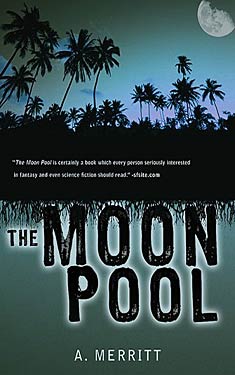A Merritt
Completed 1/14/2018, reviewed 1/15/2018
4 stars
This is perhaps the oldest book I’ve read since high
school. It’s 99 years old this year. It shows its age, being very much part of the
adventure genre that SF was before SF existed.
But it’s still very good and a fairly easily readable introduction into
the world of early science fiction and fantasy.
There were some parts that dragged, but in general, it was a wildly
imaginative adventure from a time when the earth still had undiscovered places.
The story is about a group of people who find a secret
passageway to an underground civilization.
Specifically, Dr. Walter Goodwin finds out about a vampiric energy field,
which they call the Dweller, that comes out during the full moon and captures
people and sucks the life out of them.
He takes Larry O’Keefe, a roguish Irish-American, Olaf Huldriksson, a
Norse boat captain whose wife and daughter were abducted by the Dweller, and Marakinoff,
a Bolshevik from the newly formed Soviet Union.
They enter through a portal at some ruins in the South Pacific. There they meet several races, including frog
people as well as humans who seem to be related to Polynesians.
The prose for the most part is quite delicious. Merritt uses some great language in
describing the underground caverns and their denizens. Sometimes it dragged a bit, but in general it
was enjoyable. One thing that bothered
me though was that he overused some of his descriptive words, like lambent and
coruscating. At times it became almost
comical when the words came up. It
reminded me of a sketch from The Kids in the Hall where a guy in a factory learns
a new word and uses it in every sentence.
While it’s not that bad, it does become obvious as you progress through
the book.
Another complaint I had was that the story eventually devolves
into a love story and love tries to conquer all. This is the place where the book doesn’t hold
up over time. However, I have to put the
book in context. Today, love stories have
to be complex to be entertaining and believable. A hundred years ago, this may have not been
the case, particularly in science fiction adventure stories.
There isn’t that much science in the book. Specifically, there are some sections which
are deleted because of concern over Soviet espionage. I thought this was a clever way to get around
trying to describe something that was perhaps too complicated for the
author. However, there is a retelling of
the creation of the earth and moon that reminded me of my elementary school textbook
cosmology. This being 1919, I’m thinking
it must have been quite advanced for its time.
Despite my complaints, the story is very entertaining. His visions of hidden worlds are quite
creative. I haven’t read any H.G. Wells,
Jules Verne, or Edgar Rice Burroughs, (Yes, take away my nerd card) but I’ve seen
references that compare Merritt to a sort of combination of these early
masters. If you are looking for an example
of science fiction from the time before it was so classified, this is a good
one to read. And you can get the electronic
version for free on Project Gutenberg since the copyright has expired. Four stars out of five. (And the A stands for Abraham)

No comments:
Post a Comment